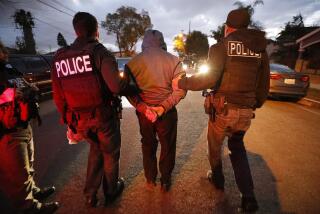She won battle to legalize interracial marriage
For marrying the only man she ever loved, Mildred Loving paid a price: She was arrested, convicted and banished from her home state.
In the 1950s, the Commonwealth of Virginia handed down such punishments to couples whose love the state did not sanction: She was black. Her husband, Richard, was white. Their union was prohibited by law.
The marriage could have collapsed under the hammer of Jim Crow. Instead, the Lovings’ challenge of the law led to a U.S. Supreme Court ruling in 1967 that toppled bans on interracial marriages nationwide and opened the door for mixed race couples to marry without prosecution.
For Loving, a soft-spoken, gentle woman who eschewed the limelight, the issue was always simple: “I think marrying who you want is a right no man should have anything to do with,” Loving said in 1967 segment on ABC News. “It’s a God-given right.”
Loving, 68, died of pneumonia Friday at her home in Central Point, Va., said her daughter, Peggy Fortune. Loving’s story was turned into a 1996 Showtime movie, and her case resonates with supporters of same-sex marriage.
The case of Loving vs. Virginia took place against a legal landscape altered by the demands and victories of the civil rights movement.
Laws supporting segregation were falling; but in 1958, when the Lovings were arrested, half of the states in the nation still had anti-miscegenation laws on the books, said Peter Wallenstein, a professor of history at Virginia Polytechnic Institute and State University in Blacksburg, Va. The laws deprived Americans of the most intimate of decisions: who would be their spouse.
“This was the last piece, and it was a big piece in the whole structure of Jim Crow,” Wallenstein said. “The Civil Rights Act of ’64 and the Voting Rights of ’65 had cleared most of that, but this one pillar stood tall.”
In Virginia’s Caroline County, where Mildred Jeter was born July 22, 1939, the prohibition against interracial marriage was long-standing. A 1691 statute outlawed marriage between whites and nonwhites.
An 1878 law introduced a penalty of up to five years in prison and a clause: Those who tried to evade the law by marrying out of state, then returning to Virginia, would be treated the same as those who had married in the state.
The Lovings had done just that. In 1958, the couple drove to Washington, D.C., married on June 2, then returned to Caroline County, where they moved in with Loving’s parents.
But in Caroline County word spread to the commonwealth’s attorney, the equivalent of a district attorney, that the two had married. He obtained a warrant for their arrests. One July night, the Lovings woke up about 2 a.m. to the see the sheriff and deputies surrounding their bed, shining flashlights and demanding to know who Mildred Loving was.
Loving explained: “I’m his wife.” Richard Loving rushed to show the men their marriage certificate. The sheriff was not moved. “That’s no good here,” he said.
“They told us to get up, get dressed. I couldn’t believe they were taking us to jail,” Loving said.
The Lovings were indicted by a county grand jury and pleaded guilty to violating the 1924 Racial Integrity Act, another version of the state’s anti-miscegenation law. Judge Leon M. Bazile sentenced the couple to a year in jail but suspended the sentence for 25 years on the condition that they leave the state and not return together during that time.
To avoid jail time, the Lovings moved to Washington, D.C., but the years in exile were difficult. Loving missed her family, her friends, the rural life. In 1963, she wrote to Robert F. Kennedy, then the U.S. attorney general, and asked for his help.
The Justice Department referred the couple to the American Civil Liberties Union, where attorney Bernard Cohen and later Philip J. Hirschkop took on the case.
“I knew it was going to be a landmark case,” Cohen said in the Chicago Tribune in 1992. “And I definitely thought there was something serendipitous about the fact that the case would be called Loving vs. the Commonwealth of Virginia.”
Marriage was “a subject which belongs to the exclusive control of the states,” he wrote. But even at the state level, such cases had been successfully challenged before and times were changing, said Wallenstein, who interviewed Loving and wrote about the case for his book “Tell the Court I Love My Wife: Race, Marriage, and Law -- An American History.”
The Lovings never intended to be activists; they wanted to be married and live in Virginia. But their case landed at the Supreme Court. On June 12, 1967, the Supreme Court ruled 9 to 0 that Virginia’s laws were aimed at white supremacy, were unconstitutional and violated the 14th Amendment.
Chief Justice Earl Warren wrote in the opinion that marriage is “one of the ‘basic civil rights of man,’ fundamental to our very existence and survival.
“To deny this fundamental freedom on so unsupportable a basis as racial classification embodied in these statutes . . . is surely to deprive all the state’s citizens of liberty without due process of law.”
After the decision, Loving said, “I feel free now.” The couple moved back to Virginia. But in 1975, Richard Loving was killed by a drunk driver in a car accident. Mildred Loving, who never remarried, died one month shy of what would have been their 50th wedding anniversary.
In addition to her daughter, Loving is survived by a son, Sidney of Tappahannock, Va.; eight grandchildren; and 11 great-grandchildren. A son Donald died in 2000.
A funeral will be held at 11 a.m. Saturday at the Caroline Community Services Center in Bowling Green, Va.
--
More to Read
Start your day right
Sign up for Essential California for news, features and recommendations from the L.A. Times and beyond in your inbox six days a week.
You may occasionally receive promotional content from the Los Angeles Times.






